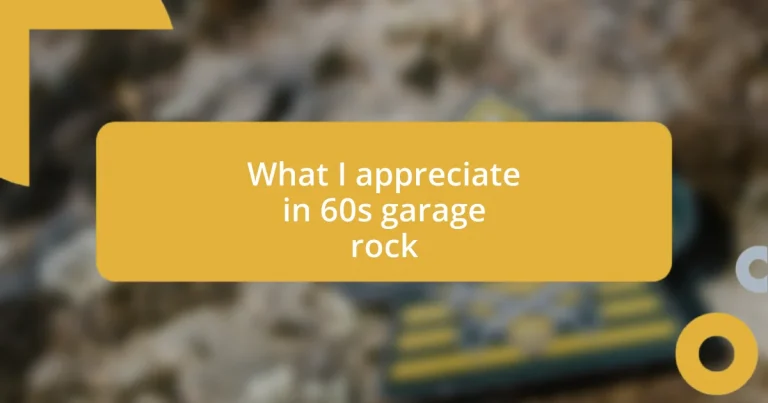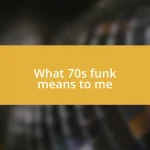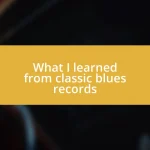Key takeaways:
- Garage rock in the 60s embodied youthful rebellion, characterized by its raw sound, DIY ethos, and simple song structures, fostering a sense of authenticity and spontaneity.
- Influential bands like The Sonics, The Kingsmen, and The Mysterians shaped the genre, leaving a lasting impact on music history and inspiring future rock movements, including punk and alternative rock.
- The legacy of garage rock continues in modern music through artists like The Black Keys, highlighting its enduring influence on creativity, cultural identity, and the DIY movement across various artistic fields.
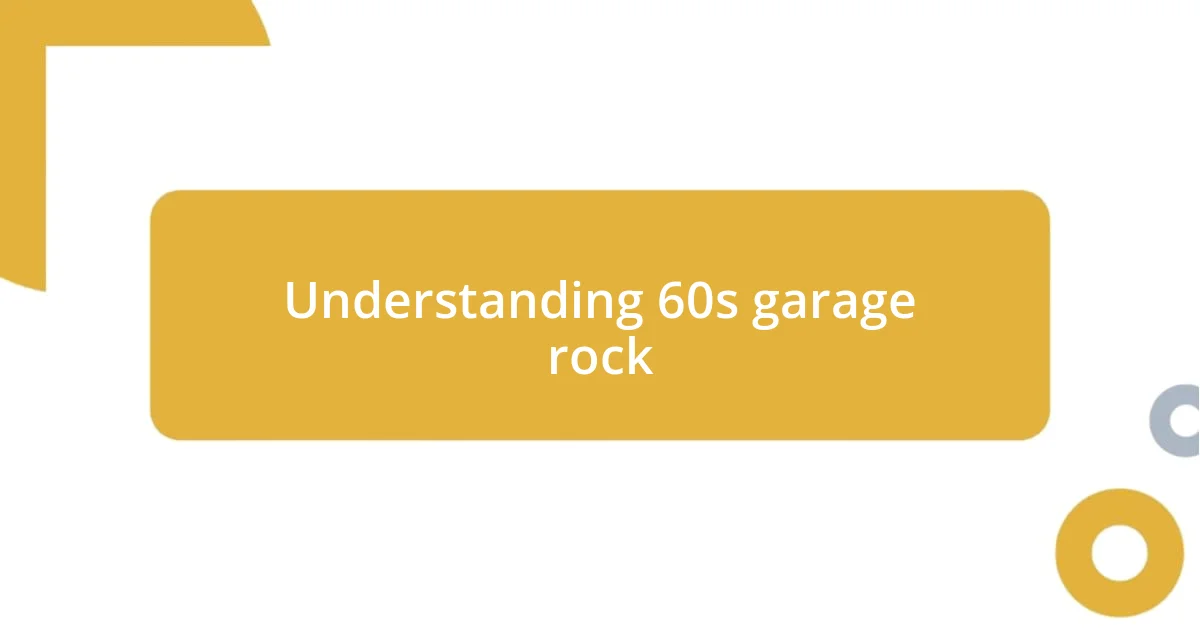
Understanding 60s garage rock
Garage rock in the 60s was a raw and unrefined expression of youthful rebellion. I remember listening to bands like The Sonics and The Seeds, feeling a rush of energy that seemed to emanate straight from their guitars. Doesn’t it strike you as amazing how these tracks captured the essence of teenage angst and freedom?
This genre thrived in suburban America, where local bands would record in makeshift studios, pouring their heart, soul, and a bit of chaos into every song. I’ve always found it fascinating how these bands created music that resonated so deeply with their audience—like a shared secret that somehow spoke to a generation. Have you ever wondered how something so simple could evoke such powerful emotions?
What truly sets 60s garage rock apart is its DIY spirit, embodying a sense of authenticity and spontaneity that is often lacking in today’s polished productions. I can’t help but smile when I think of those lo-fi recordings; they personified a carefree and wild experimentation. When you listen closely, can you hear the enthusiasm pouring out with every riff? It’s like the music itself is inviting you to join in on their unfiltered joy.
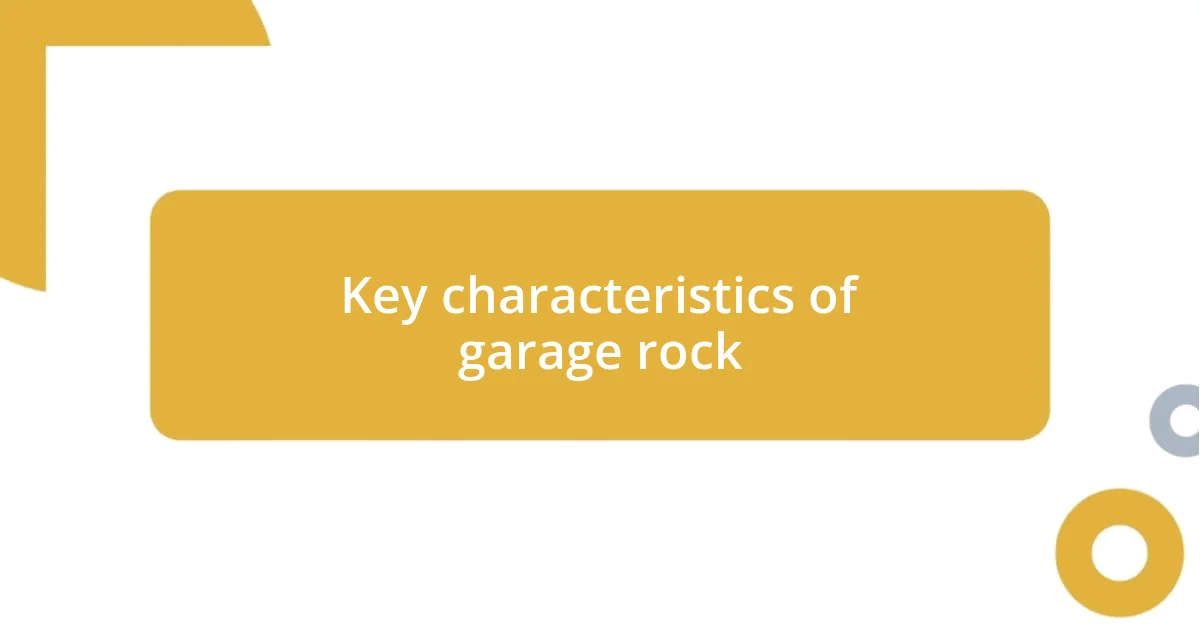
Key characteristics of garage rock
Garage rock is characterized by its raw sound and a rebellious attitude that reflects the spirit of the era. One striking feature is the use of distorted guitars. I can still recall hearing that gritty buzz for the first time—it was like a jolt of electricity coursing through me. The simplicity of the instrumental setups allowed for a focus on high-energy performances, creating music that felt immediate and alive.
Here are some key characteristics that define garage rock:
- Simple Song Structures: Typically straightforward, often following a verse-chorus format, making the music accessible.
- Raw Recording Quality: Many tracks feature a lo-fi sound, celebrated for its authenticity rather than polished perfection.
- Energetic Vocals: Vocal delivery is often passionate and gritty, reflecting the emotion and urgency behind the lyrics.
- Unconventional Lyrics: Themes often revolve around teenage life, love, and disillusionment, capturing the angst of youth.
- DIY Ethos: Bands frequently recorded in home studios or with minimal equipment, emphasizing individuality and creativity.
Listening to these tracks truly transports me back to the excitement of my youth, where every riff felt like a call to express oneself freely, without inhibition.
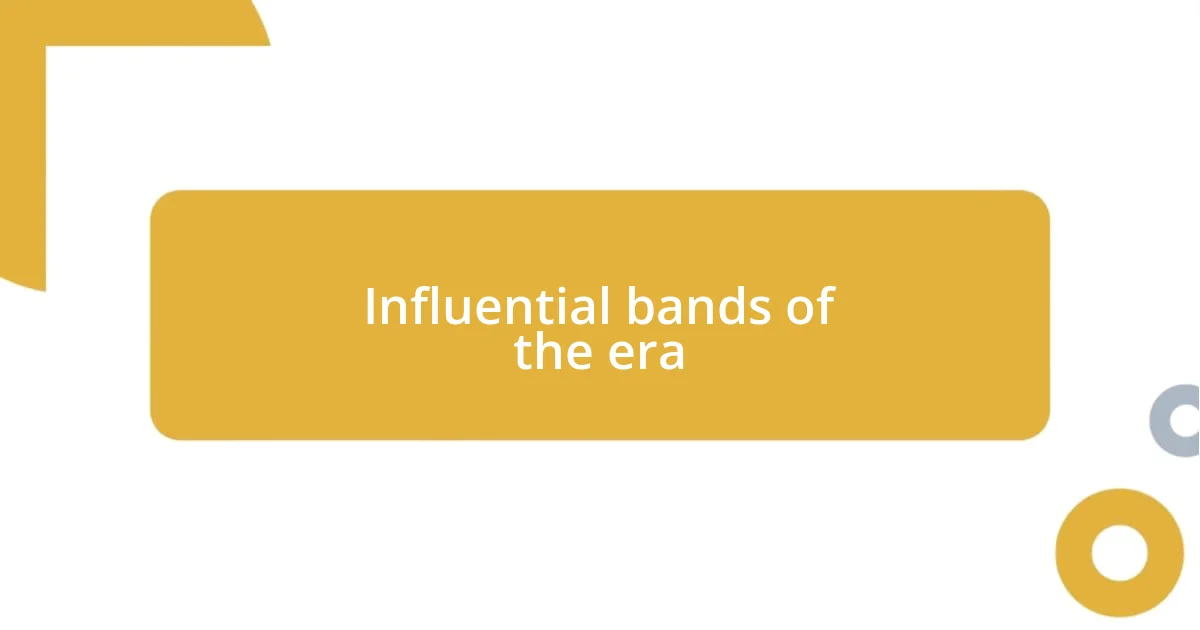
Influential bands of the era
The 60s garage rock scene was deeply influenced by a handful of iconic bands that left an indelible mark on music history. The Mysterians, with their relentless hit “96 Tears,” encapsulated the genre’s urgency and emotion. I still remember the first time I heard that song—it felt like a revelation, as if they were speaking directly to my youthful spirit, thirsting for rebellion.
Then there’s The Kingsmen, whose cover of “Louie Louie” ignited a frenzy and laid the groundwork for future rock bands. The chaotic energy of their performance made me believe that music could be raw yet revolutionary. It’s fascinating how these bands informed not just their peers, but also the sounds of punk and alternative rock in the years that followed.
Let’s not forget The Standells, whose anthem “Dirty Water” perfectly captured the essence of the era’s attitude. I often find myself humming that tune, recalling the carefree days spent with friends, as the gritty riffs echoed our collective vibe. It’s like each song transports me back to the garage parties where we’d dance unreservedly, embracing the music as our own anthem of youthful defiance.
| Band | Influence |
|---|---|
| The Sonics | Pioneering raw sound and energetic performances |
| The Seeds | Defined the essence of garage rock with their surf influences and psychedelic themes |
| The Kingsmen | Revolutionized rock with their iconic hit “Louie Louie” |
| The Mysterians | Fused punk with garage rock, bringing raw urgency to their music |
| The Standells | Embodying the rebellious spirit with their anthem “Dirty Water” |
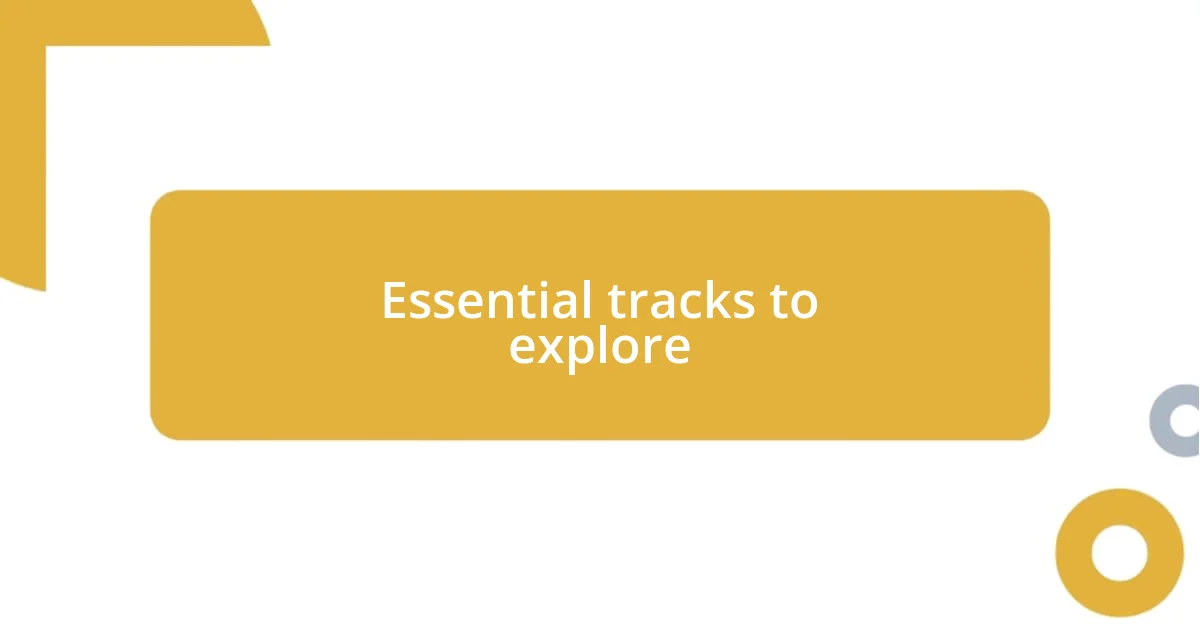
Essential tracks to explore
Exploring essential tracks in garage rock is like opening a treasure chest filled with raw emotion and electrifying sound. One standout track is “Psychotic Reaction” by The Count Five. The first time I heard that iconic opening riff, I felt an adrenaline rush that was impossible to ignore. Can a simple, yet infectious melody really capture the essence of youthful angst? Absolutely! It’s a track that perfectly balances chaos and melody, sending you on a rollercoaster of feelings.
Another essential listen is “Satisfaction” by The Rolling Stones. I remember the first time it blasted through my speakers—an instant reminder of how powerful rebellion can be. The gritty vocals and distorted guitar immediately transport me to a dimly lit garage, where a passionate band is pouring their hearts into their music. It’s not just a song; it’s a cultural moment that resonates with anyone who’s ever felt the urge to push back against the norm.
Then there’s “You Really Got Me” by The Kinks. This track is an explosive mix of urgency and longing, showcasing how garage rock could tap into deeper emotions while keeping that raw edge. It takes me back to countless afternoons spent cranking up the volume and getting lost in the music, the pounding rhythm echoing my own desire for freedom and connection. Have you ever felt a song shake you to your core? That’s precisely what this track delivers, embodying the very spirit of garage rock.
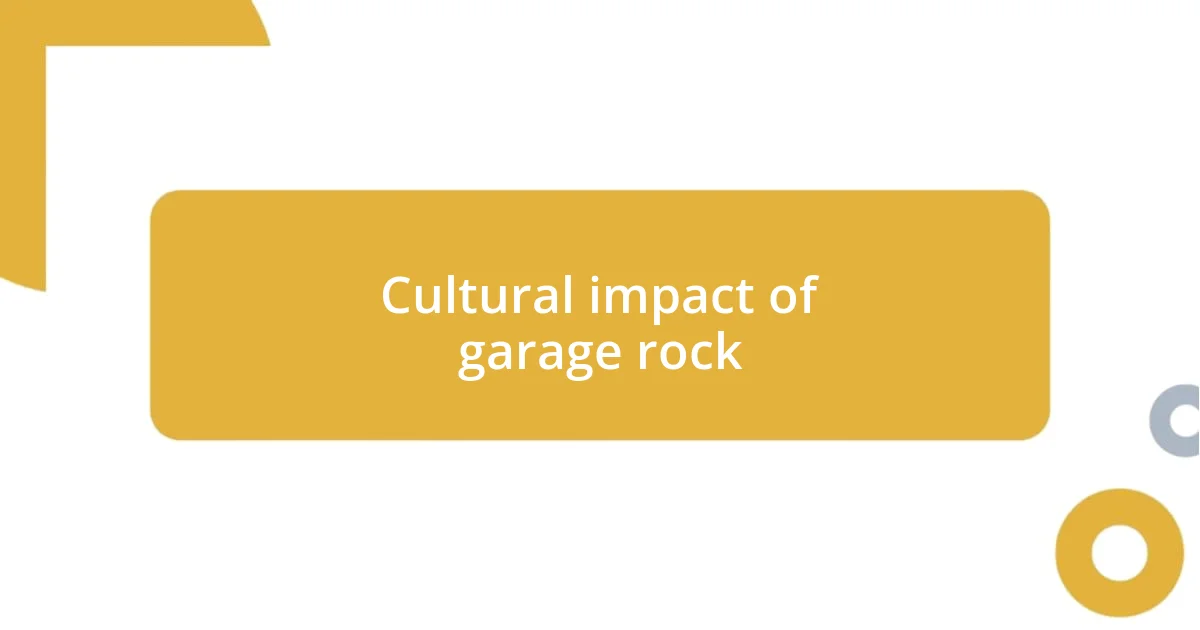
Cultural impact of garage rock
The cultural impact of garage rock resonates through generations, embedding itself in the fabric of music history. When I think back to the raw, unfiltered energy of those tracks, it’s clear they fostered a sense of rebellion that transcends mere sound. It was about a collective yearning for authenticity during a time of societal upheaval—how powerful is that feeling, right?
I remember discussing the genre with my friends over countless late-night jam sessions. We’d dissect its influence not just on rock, but on pop culture as a whole. The DIY ethos that originated in those garage bands speaks to the heart of creativity—how it encourages individuals to pick up an instrument and create something meaningful, regardless of technical prowess. Can you recall the first time you felt inspired to create?
The echoes of garage rock went beyond the music itself—it permeated fashion and attitude. From thrift store finds to that unmistakable cool attitude, it’s fascinating how the spirit of those bands continues to inspire young artists today. I still see elements of that raw spirit in modern acts; it’s a constant reminder that music can challenge norms and ignite a spark of change. Isn’t it incredible how a sound weighs so heavily on cultural identity?
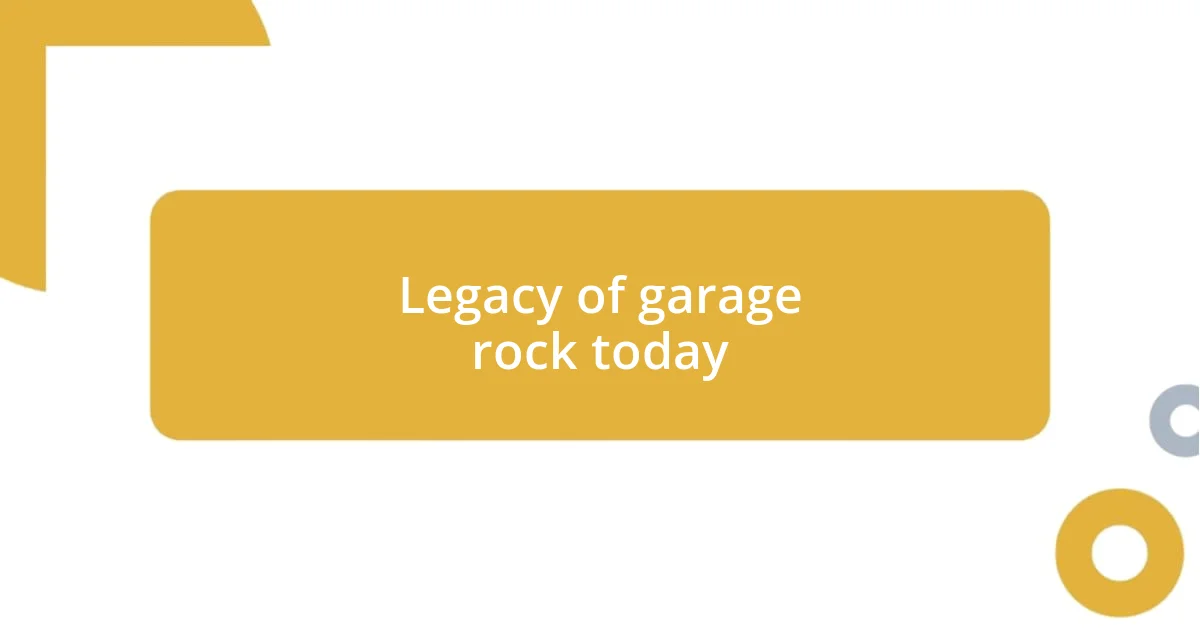
Legacy of garage rock today
The legacy of garage rock lives on vibrantly in today’s music scene. I often find myself drawn to modern bands like The Black Keys and Ty Segall, who channel that same gritty, unrefined energy that defined the genre in the 60s. It feels as though they’ve taken the torch, blending classic garage rock elements with contemporary sounds—how amazing is it that the spirit of those early bands still inspires today’s artists?
I remember being at a local gig where a young band covered “Louie Louie.” The entire room erupted with energy; it felt like I had stepped back in time. Seeing that much enthusiasm reminds me how garage rock’s raw, rebellious essence can still ignite a fire within audiences. Can you recall a moment when music brought a crowd together like that? It’s unforgettable.
Moreover, the DIY movement sparked by garage rock inspires not just musicians, but also creatives across various fields. I sometimes catch myself reflecting on how these garage bands taught us to embrace imperfection, to create without inhibition. Isn’t it liberating to think that anyone can start a band in their garage and reach an audience today? This legacy of empowerment reshaping our creative landscape is a testament to the enduring influence of garage rock.












